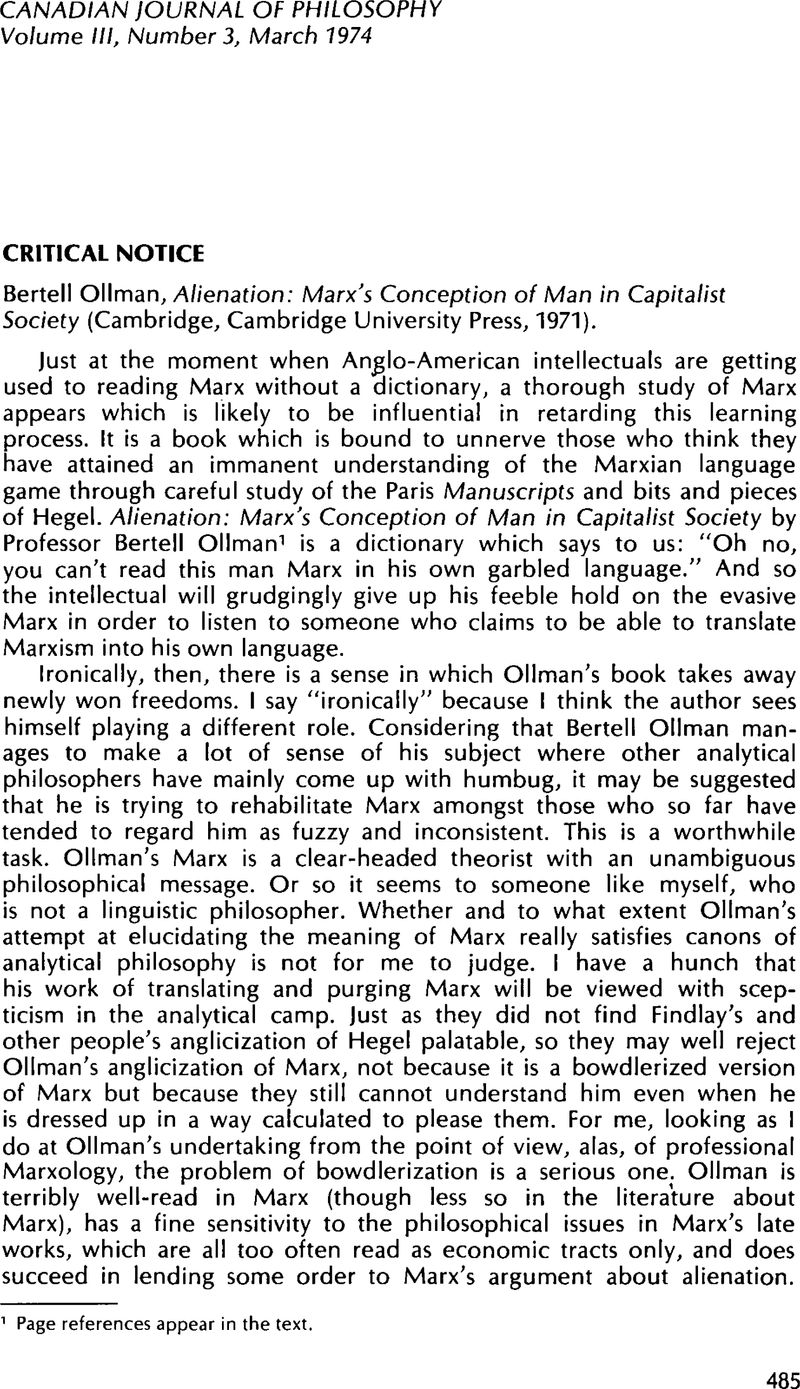No CrossRef data available.
Article contents
Bertell Ollman Alienation: Marx's Conception of Man in Capitalist Society (Cambridge, Cambridge University Press, 1971).
Review products
Published online by Cambridge University Press: 01 January 2020
Abstract

- Type
- Critical Notice
- Information
- Copyright
- Copyright © The Authors 1974
References
1 Page references appear in the text.
2 The idea of distinct stages in Marx's work has recently been propagated anew by Louis Althusser and his school. Although Oilman disagrees with Althusser on this particular point, inisisting on an integral reading of Marx, the viewpoint of internal relations seems to have much in common with structuralist Marxism. For an account of the negative reaction by Soviet and East European communists to the Manuscripts of 1844, see Dunayevskaya, Raya Marxism and Freedom, New York, 1958, pp. 62–66.Google Scholar
3 Sartre is only the most notorious among a large number of Marxist critics of official Marxism-Leninism. See his Critique de la raison dialectique, Paris, 1960, also Marxisme et existentialisme, Paris, 1962, where both Sartre and Jean Hyppolite marshal important Marxist arguments against dialectical materialism in the form given to it by Engels. In a similar vein: Lichtheim, George Marxism, London, 1964, pp. 234–258;CrossRefGoogle Scholar Jordan, Z. A. The Evolution of Dialectical Materialism, New York, 1967Google Scholar; Fetscher, Iring “Von der Philosophie des Proletariats zur proletarischen Weltanschauung,” in Marxismus-Studien, Tübingen, 1957, v. 2Google Scholar. Perhaps the best statement of this ‘separatistic’ interpretation of Marx can be found in Schmidt, Alfred The Concept of Nature in Marx, New York, 1971, pp. 19–61Google Scholar and 165-196. For Oilman's views on the subject, see Alienation, ch. 5.
4 Marx, K. Grundrisse der Kritik der politischen Ökonomie, Berlin, 1953, pp. 375–413Google Scholar.
5 Marx, Capital (International Publishers, 1967), v. 1, p. 334.Google Scholar
6 Grundrisse, op. cit., p. 387.
7 Marx himself preferred to speak of materialistische Geschichtsauffassung or materialist view of history.
8 Einleitung zur Kritik der politischen Ökonomie, in Marx-Engels, Werke, Berlin, v. 13, p. 636.
9 Further tensions exist between universalization and abstraction (isolation) in capitalist society. This is profoundly analyzed in Lukacs’ essay on “What is orthodox Marxism,” in Geschichte und Klassenbewusstsein (Neuwied, 1968), pp. 58-93, especially pp. 64-71.
10 This notion, familiar enough to the reader of the early Marx, crops up as well in the late Theories of Surplus-Value: “Production for production's sake means nothing but the development of human forces of production, i.e. the development of the wealth of human nature for its own sake.” Marx-Engels, Werke, v. 26/11, p. 111, quoted in Lukacs, op. cit., p. 17.
11 Habermas, J. Knowledge and Human Interests, Boston: Beacon Press, 1971, p. 28.Google Scholar
12 A. Schmidt, op. cit., ch. Ill, B, and J. Habermas, op. cit., Part I.
13 Schmidt, op. cit., pp. 108-109.




